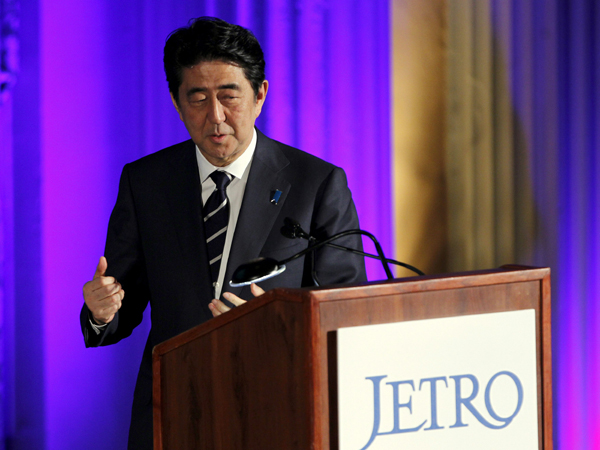Disappointing word game, statesmanship
Updated: 2015-05-08 07:42
(China Daily)
|
|||||||||||
 |
|
Prime Minister of Japan Shinzo Abe speaks at the Japan-US Economic Forum at the Millennium Biltmore Hotel, May 1, 2015, in Los Angeles. [Photo/Agencies] |
The UN General Assembly on Tuesday convened a solemn meeting to commemorate all the victims in World War II. What happened 70 years ago marks some darkest pages in the history of humanity, and all members of the international community should take to heart the lessons from the past and guard against any ill tendency that tries to resurrect the ghost of war again.
When representatives from American, African, Asian and European countries addressed the UN special meeting, they used such phrases as "untold misery and suffering", "unspeakable atrocities", "brutal scourge" and "tremendous sacrifices". More than 2 billion people across the globe fell victim to this calamity, and many of them died without knowing why they had to die.
The best commemoration to WWII is to objectively learn from history so it can provide lessons and insights for tackling the challenges of the future.
The historical facts of 70 years ago are ironclad, and a final verdict has already been made on what was right and what was wrong. Yet, looking around the world, there is still one country that still has trouble recognizing the truth.
Japan, one of the perpetrators of the war, is trying to deny what it did in China, the Republic of Korea and other Asian countries in its history of aggression.
Last week, when Japanese Prime Minister Shinzo Abe addressed the US Congress, he intentionally buried the chance of being straightforward about Japan's behavior of 70 years ago and making a formal apology to the victims of Japan's aggression.
As this year marks the 70th anniversary of the victory in the war against fascism, the Japanese leader cannot pretend to be ignorant to the mounting pressure from the world on his government to acknowledge this infamous part of his country's history.
On Tuesday, a group of 187 internationally renowned history scholars jointly issued a statement, urging Japan to acknowledge and apologize for its wartime sex slavery, saying "denying or trivializing" it is "unacceptable".
Earlier in February, a similar statement was issued by some 20 members of the American Historical Association.
Such rare collective actions by historians from different regions show the international community is concerned about Japan's attempts to gloss over its military past. The world should continue to uphold the truths of history and pressure Japan into facing up to them squarely.
Related Stories
China slams Japan UNESCO bid for 'colonial' sites 2015-05-07 21:18
US helping revive ghost of Japan's military past 2015-05-06 07:53
Response to Japan PM's speech, visit 2015-04-30 13:52
At Harvard, protesters demand Abe to apologize for Japan's wartime crimes 2015-04-28 10:30
Today's Top News
China-UK relations likely unaffected by election
China 'willing' to seek EU investment treaty
Record number of Chinese seek poll success
Russia's Putin, Germany's Merkel to discuss Ukraine on May 10
China pledges continued help as Nepal rebuilds
Rolling stock company forges ahead in Russia
Denmark receives 3 bomb threats in one day: media
Bilateral efforts 'inject fresh impetus'
Hot Topics
Lunar probe , China growth forecasts, Emission rules get tougher, China seen through 'colored lens', International board,
Editor's Picks

|

|

|

|

|

|






